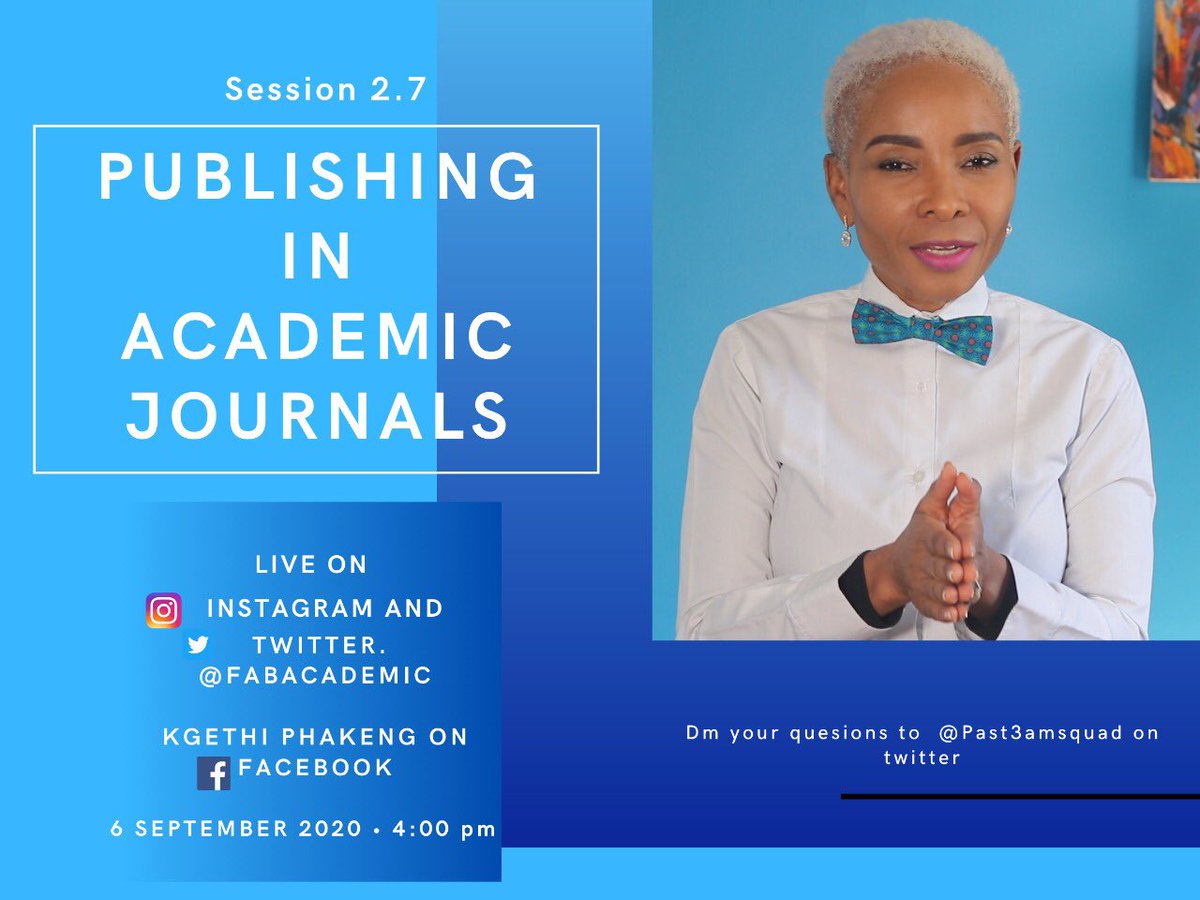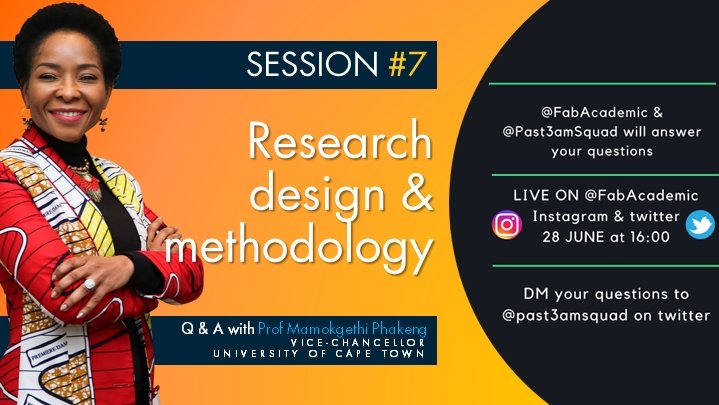
My take home from today's session, titled "Decolonising Higher Education". Prof @FabAcademic was joined Prof Siphamandla Zondi
@siZondi.
@past3amsquad #Past3amSquad #academiccareer #postgradtalk
@siZondi.
@past3amsquad #Past3amSquad #academiccareer #postgradtalk

1. Decolonisation is the undoing of colonialism, the latter being the process whereby a nation establishes and maintains its domination of overseas territories.
2. Prof @FabAcademic said that the FeesMustFall student movement forced universities to decolonise.
2. Prof @FabAcademic said that the FeesMustFall student movement forced universities to decolonise.
3. Prof @siZondi said that decolonisation is NOT about:
•reforming the universities nor the higher education
•changing the face of the universities
•mere replacement
•fighting against
•just a movement
•reforming the universities nor the higher education
•changing the face of the universities
•mere replacement
•fighting against
•just a movement
4. Prof @siZondi said that decolonisation is about removing that which is colonial about universities.
5. Colonial refers to the arrival of the British in SA with their logic of clear straight lines of order, correctness and modernism and coming among people with a cirle view.
5. Colonial refers to the arrival of the British in SA with their logic of clear straight lines of order, correctness and modernism and coming among people with a cirle view.
6. The logic of hierarchy lies in the grading system. If you conform you pass and meet the level of advancement and if you don't conform you faip and don't meet that level of advancement.
7. Prof @siZondi said that there's a pyramid which has a few people at the top and more people at the bottom. This grading hierarchical system divides people into the two levels of the pyramid.
8. Prof further told us about his uncle who dropped out of school in what is know...
8. Prof further told us about his uncle who dropped out of school in what is know...
today as grade 3 because he refused to be taught what wasn't his lived experience, what was western knowledge. They aim to empty your knowledge and infuse theirs into you.
9. Prof @siZondi said that the number 1 to 10 (top 10) in schools taught is arrogance, as it teaches us..
9. Prof @siZondi said that the number 1 to 10 (top 10) in schools taught is arrogance, as it teaches us..
that you must not succeed with others but againt others. A divide and conquer mentality.
10. Fundamentally, what we can do is to deal with what we see in our everyday live that reinforces the way of colonialism in curriculums, policies etc.
10. Fundamentally, what we can do is to deal with what we see in our everyday live that reinforces the way of colonialism in curriculums, policies etc.
11. We need to change the hierarchy in universities before decolonising the curriculum.
12. As a professor it is your responsibility to conscientise your students. -Prof @siZondi
12. As a professor it is your responsibility to conscientise your students. -Prof @siZondi
13. Accepting that we're colonial ourselves is very important, while we work on ourselves daily. You kust unshackle yourself first.
14. Prof @siZondi said that we need to repent first, that we're products of colonialism and help others to acknowledge it as well.
14. Prof @siZondi said that we need to repent first, that we're products of colonialism and help others to acknowledge it as well.
15. We need to do the Frantz Fanon prayer which is "teach me to question".
Black Skin, White Masks applies a historical critique on the complex ways in which identity, particularly Blackness, is constructed and produced....
Black Skin, White Masks applies a historical critique on the complex ways in which identity, particularly Blackness, is constructed and produced....
Fanon confronts complex formations of colonized psychic constructions of Blackness in the book. He claims that decolonization is inherently a violent process, because the relationship between the settler and the native is a binary of opposites.
16. We need to disrupt our mental models, albeit not an easy thing to do. Start with consciousness, questioning and being intentional.
17. Utilising elders in communities can be a way of decolonising higher education, as they can bring real life lived experience knowledge.
17. Utilising elders in communities can be a way of decolonising higher education, as they can bring real life lived experience knowledge.
18. Decolonising would mean unlearning the colonial habits we adopted from the colonial system. Thus, decolonisation = inclusiveness and requires introspection. We are missing out on a wealth of knowledge by not incorporating indigenous knowledge system.
19. Humility is very important when talking about decolonising, as well as thinking about what is out there in the communities that we can benefit from and expanding your circle and undoing the teachings of the textbook but rather co-creating knowledge with elders in...
communities and teaching students to ask questions and using Ntate Mokoena as a co-supervisor or guest lecturer. You need to disrupt that is seen as normal.
20. Tackle the mind, which is the powerhouse.
20. Tackle the mind, which is the powerhouse.
21. Disrupt and rebel against norms and tradition whether written or non-written. We need to ask more questions than we answer!!!
22. We need to interrogate what was superimposed by the education system. And change the logic conversations in lecture halls and focus on action...
22. We need to interrogate what was superimposed by the education system. And change the logic conversations in lecture halls and focus on action...
learning. Bring the real problem into the class.
23. Prof @siZondi said that the only person who was not successful at being colonised is the onw who dropped out of school early, it is us who succeeded in being colonised.
23. Prof @siZondi said that the only person who was not successful at being colonised is the onw who dropped out of school early, it is us who succeeded in being colonised.
24. Colonial doesn't require us to innovate. Colonial is rewarded and normalized.
25. Mastering templates becomes a problem later in the work environment.
25. Mastering templates becomes a problem later in the work environment.
26. The system doesn't want us to disrupt because this will mean the rise of decolonisation.
27. Consciousness is very important! And your skin color has nothing to do with you being colonised. Black Skin White Mask.
27. Consciousness is very important! And your skin color has nothing to do with you being colonised. Black Skin White Mask.
Prof @FabAcademic perhaps we can touch on Africanisation/Africanization as response to colonialism. If it's the way to go or if it's problematic etc?
Prof @FabAcademic thank you very much for such a great and powerful session and for continuingto creat a platform to teach and inspire students & young emerging academis. Rea go leboga Mme Mamokgethi.
Prof @siZondi our favorite researchER. Thank you for sharing your insights...
Prof @siZondi our favorite researchER. Thank you for sharing your insights...
knowledge and insights with us, we can't wait to listen to you again nextweek.
Join us next week for part to of this session. All the best with the coming week. 📚🙏🏾🎓
Join us next week for part to of this session. All the best with the coming week. 📚🙏🏾🎓
• • •
Missing some Tweet in this thread? You can try to
force a refresh





